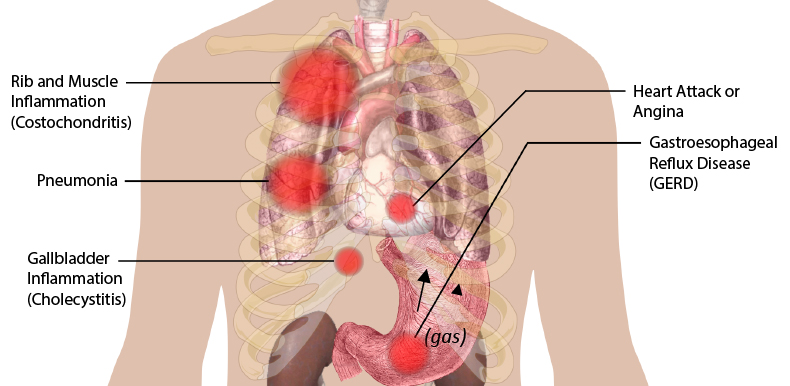
FAST FACTS: Chest Pain
Chest pain is any pain located in the chest and does not need to be heart related. Chest pain is common in older adults and causes people to worry because of the potential association with the heart. It is sometimes difficult to tell heart pain from other types of chest pain. Key things to look for include: 1) the way the pain is described; 2) whether the pain is related to exercise; and 3) whether the pain is relieved by receiving oxygen.

Chest Pain Description
- Cardiac (heart related) pain is typically described as a pressure and squeezing of the heart area
- Non-cardiac (non-heart related) pain is often described as sharp, burning, or painful if someone taps or puts gentle pressure on the chest
- Older adults and women do not always have typical symptoms
Potential Causes/Treatment - Heart Related Chest Pain
- Lack of oxygen to the heart
- Described as heaviness, pressure, squeezing, or pain in left arm
- More common in men over 60
- Treatment: Improved or relieved with additional oxygen or nitroglycerine medication
- Inflammation of the membrane around the heart
- Often sharp intense pain starting in the abdomen/back; may travel to thigh/scrotum
- May or may not have fever; heart rate typically higher; NOT relived by oxygen
- Treatment: Medication typically needed
- Painful heartbeat
- Occasionally have chest pain but usually no symptoms
- Treatment: Medication
Potential Causes/Treatment - Non-Cardiac Chest Pain
- Pulmonary (related to lungs)
- Often described as sharp, intermittent pain; can be worse with breathing
- May have shortness of breath and rapid heartbeat
- Treatment: Oxygen may help; Ibuprofen, Acetaminophen, or other pain medications
- Gastrointestinal (related to digestive system)
- Often causes sharp intense pain which is not relived by oxygen
- May or may not also have a fever; heartrate typically elevated
- Treatment: Medication typically needed
- Musculoskeletal (related to bones and muscles)
- Pain is usually sudden and localized; could be associated with muscle trauma or a severe cough
- Pain worse with deep breath
- Treatment: Ice or heat may help; Ibuprofen may also help
- Chest wall pain
- Pain is usually sudden and localized; could be associated with a trauma to a muscle or from a severe cough
- Pain is worse with deep breath
- Treatment: Ice or heat; non-steroidal anti-inflammatory medications may also help
- Mental or emotional
- Symptoms do not fit with physical signs
- Treatment: relaxation, oxygen, massage
What Else You Should Do
- Write down and share information about your loved one’s pain with their healthcare provider
- Use a Pain Diary to note important information useful to the healthcare provider
- Encourage your loved one to try a non-drug treatment and document the impact on their pain in their Pain Diary
References:
- Mayo Clinic. October 20, 2021. Chest Pain. Accessed 3.13.2022. https://www.mayoclinic.org/diseases-conditions/chest-pain/symptoms-causes/syc-20370838
- Harvard Health Publishing, Harvard Medical School. August 29, 2020. Chest pain: A heart attack or something else? Accessed 3.13.2022. https://www.health.harvard.edu/heart-health/chest-pain-a-heart-attack-or-something-else
Revised January 2022
